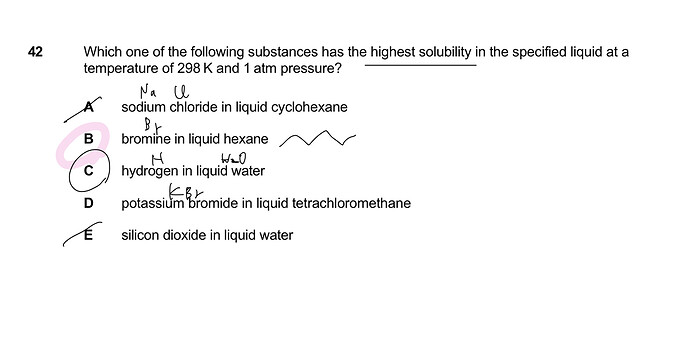I want explanation to solve this problem. B is answer.
In addition are there good materials to understand solubility?.
Hi!
In this particular question we can use the fact that like dissolves like and can eliminate options on this basis.
A: Nacl is polar which liquid cyclohexane is an organic solvent and is non polar so Nacl will not dissolve in it.
B: Bromine and hexane are both non polar, so this could be the answer.
C: Hydrogen is non-polar, water is polar, so this can’t be the answer.
D: Potassium bromide is polar, tetrachloromethane is non polar, so this can’t be the answer.
E: silicon dioxide is non polar while water is polar, so this can’t be the answer.
So B is the answer.
Hope it helps:)
Thank you!
We need to remember what molecule are polar or not to solve this kind of questions.
Hi!
I think having a general idea of elements would do good as when metals and non metals combine to form compounds they are generally polar although this may not be always true as there are always exceptions in chemistry but you can use it as a general rule.
Also compounds made of non-metals or organic compounds and ones having symmetry(i.e having no net dipole) or molecules made of a single elements are generally considered as non polar (eg: Br2).
Hope it helps:)
Hi! Just wanted to know something, all organic solvents are non polar right? Is it because of the C-H bond? And is ethanol polar because of the O-H bond or not?
Hi!
i would say not all but majority of organic compounds are non-polar there are some exceptions as polarity might vary depending on the functional group attached to the compound.
yes, Ethanol is polar due to the presence of -OH although it also has the ethyl group (-C2H5) which make it an excellent solvent for both polar as well as non-polar molecules.
Hope this helps!
Yes this helps a lot! I was a little confused on organic compounds with different functional groups, thank you so much for clearing it up!
